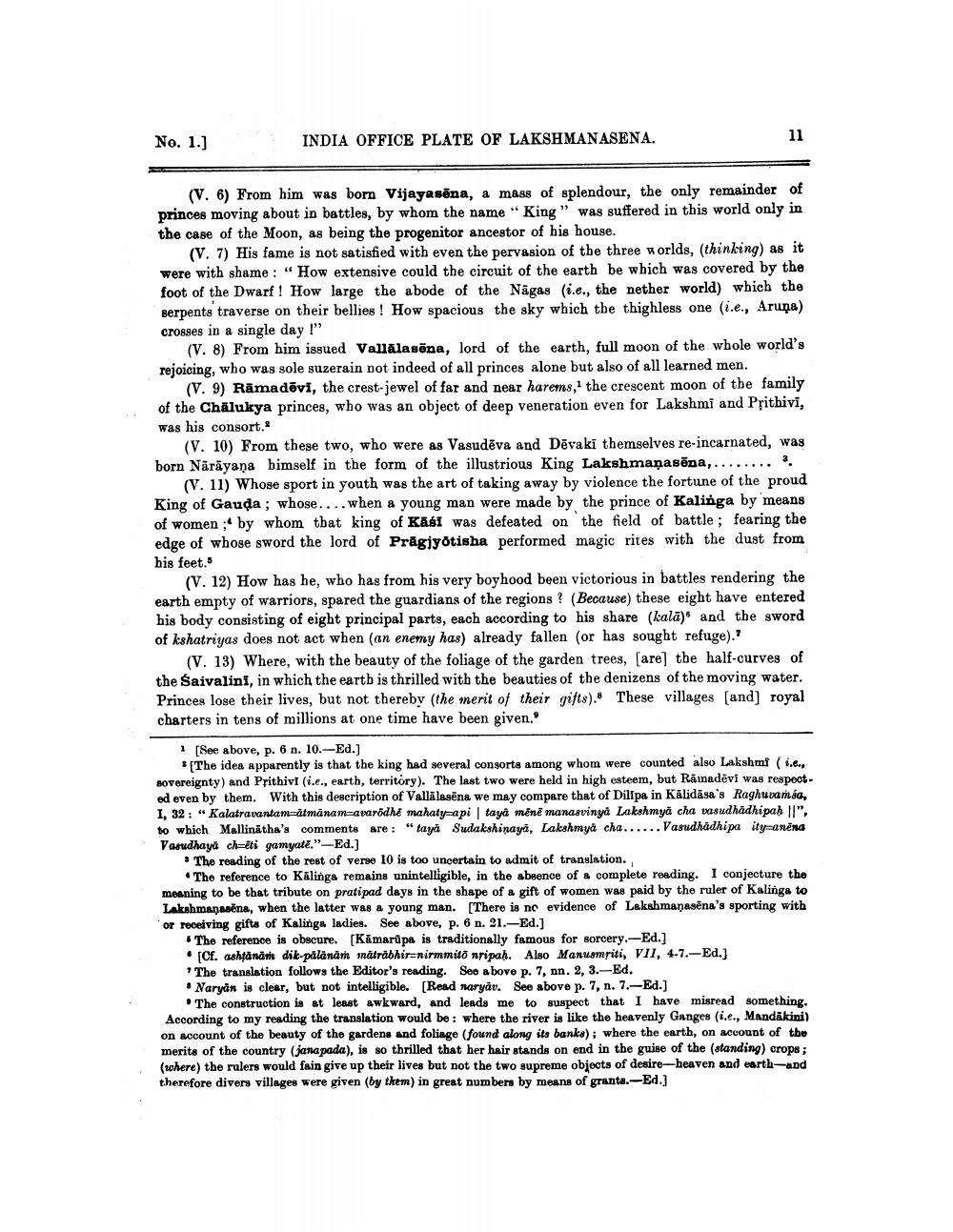________________
No. 1.)
INDIA OFFICE PLATE OF LAKSHMANASENA.
(V. 6) From him was born Vijayasēna, a mass of splendour, the only remainder of princes moving about in battles, by whom the name "King" was suffered in this world only in the case of the Moon, as being the progenitor ancestor of his house.
(V. 7) His fame is not satisfied with even the pervasion of the three worlds, (thinking) as it were with shame : “How extensive could the circuit of the earth be which was covered by the foot of the Dwarf! How large the abode of the Nägas (ie., the nether world) which the serpents traverse on their bellies ! How spacious the sky which the thighless one (i.e., Aruna) crosses in a single day!"
(V. 8) From him issued Vallalasöna, lord of the earth, full moon of the whole world's rejoicing, who was sole suzerain pot indeed of all princes alone but also of all learned men.
(V. 9) Rāma dövi, the crest.jewel of far and near harems, the crescent moon of the family of the Chalukya princes, who was an object of deep veneration even for Lakshmi and Prithivi, was his consort.
(V. 10) From these two, who were as Vasudēva and Dēvaki themselves re-incarnated, was born Nārāyana bimself in the form of the illustrious King Lakshmaņasēna,........3
(V. 11) Whose sport in youth was the art of taking away by violence the fortune of the proud King of Gauda; whose....when a young man were made by the prince of Kalinga by means of women ;' by whom that king of Kāśl was defeated on the field of battle ; fearing the edge of whose sword the lord of Prāgiyotisha performed magic rites with the dust from his feet.
(V. 12) How has he, who has from his very boyhood been victorious in battles rendering the earth empty of warriors, spared the guardians of the regions? (Because) these eight have entered his body consisting of eight principal parts, each according to his share (kalā) and the sword of kshatriyas does not act when (an enemy has) already fallen (or has sought refuge).'
(V. 13) Where, with the beauty of the foliage of the garden trees, are) the half-curves of the Saivalini, in which the eartb is thrilled with the beauties of the denizens of the moving water. Princes lose their lives, but not thereby (the merit of their gifts). These villages [and] royal charters in tens of millions at one time have been given.
1 (See above, p. 6 n. 10.-Ed.]
*[The idea apparently is that the king had several consorts among whom were counted also Lakshmi (1..., sovereignty) and Prithivi (i.e., earth, territory). The last two were held in high esteem, but Ramadevi was respect. ed even by them. With this description of Vallalasēna we may compare that of Dilipa in Kalidasa's Raghuvamsa, I, 32: "Kalatravantam=ātmānam=avaródhe mahaty-api tayā mēnë manasvinya Lakshmya cha vasudhadhipah II", to which Mallinātha's comments are: "tay, Sudakshinaya, Lakshmya cha......Vasudhadhipa itywanena Vasudhaya ch=ēti gamyate."--Ed.)
The reading of the rest of verse 10 is too uncertain to admit of translation.
•The reference to Kalinga remains unintelligible, in the absence of a complete reading. I conjecture the meaning to be that tribute on pratipad days in the shape of a gift of women was paid by the ruler of Kalinga to Lakshmanasēns, when the latter was a young man. There is no evidence of Lakshmaņasēna's sporting with or receiving gifts of Kalinga ladies. See above, p. 6 n. 21.-Ed.)
• The reference is obscure. (Kamarupa is traditionally famous for sorcery.-Ed.] . fof. ashtanan dik-palanan mátrábhir=nirmmito nipah. Also Manuemriti, VII, 4-7.--Ed.) * The translation follows the Editor's reading. See above p. 7, nn. 2, 3.-Ed. .Naryan is clear, but not intelligible. [Read maryav. See above p. 7, n. 7.-Ed.)
• The construction is at least awkward, and leads me to suspect that I have misread something. According to my reading the translation would be: where the river is like the heavenly Ganges (i.e., Mandakini) on account of the beauty of the gardens and foliage (found along its banks); where the earth, on account of the merits of the country (janapada), is so thrilled that her hair stands on end in the guise of the (standing) crops; (where) the rulers would fain give up their lives but not the two supreme objects of desire-heaven and earth-and therefore divers villages were given by them) in great numbers by means of granta.-Ed.]




